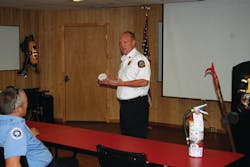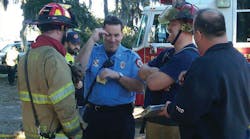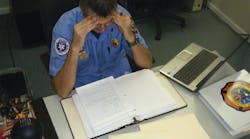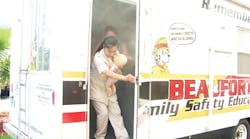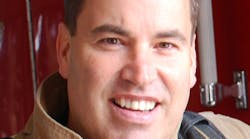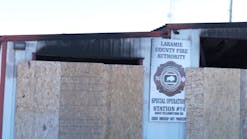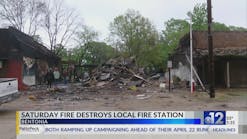Fire Prevention Week: In Memory of Megan
If your firefighters are not educated on the problem, how can they educate your citizens?
Every firefighter dreams of making a save; however, what they fail to realize is that they miss the opportunity to do so on a daily basis. This Fire Prevention Week, work on helping your firefighters make those saves every day.
I was a rookie paid on-call firefighter with the Scarborough, ME, Fire Department’s Engine 5 in 1997. My first fire, a fire which would decide my path in the fire service, occurred on November 21. The fire was in a two-story ranch home and we were told on dispatch that an infant was trapped. Engine 5 was second to arrive, and as I nervously jumped from the cab, I can still remember the sound of the awesome roar of the fire and how I could literally feel the power and heat of the flames from the street.
I was a rookie and barely knew which end of the hose pointed toward the fire, but I knew enough to know we were too late. I was a firefighter jumping off a fire truck in full bunker gear, thousands of dollars in what at the time was modern technology and every tool the National Fire Protection Association (NFPA) told us we needed to carry, and we arrived within minutes of the alarm – but I felt, and I in fact was, completely powerless.
This fire was a fatality for that trapped infant, a four-month old baby girl named Megan. Megan had just been moved mom and dad’s second-floor bedroom to her own, and as normal concerned parents would do, her parents left the bedroom doors open so they could hear their baby’s call in the middle of the night. The fire erupted on the first floor in the kitchen area and mom stated she hadn’t been in bed longer than 15 minutes when the smoke detector outside her bedroom awakened her. But it was too late. Anyone who has ever crawled down a second-floor hallway knows the heat and smoke mom and dad faced as they tried to navigate the simple five feet to Megan’s bedroom. They couldn’t make it. Mom and dad, along with the older children, all survived after finally being forced to jump from the second-story windows.
Why is this story pertinent here? Not only did the bedroom door being left open and a lack of an escape plan factor into Megan’s death, there was no smoke detector on the first floor, which could have alerted the family in enough time to grab Megan! A simple smoke detector on the first floor, along with a closed bedroom door, would have saved Megan’s life by giving her time. There were older children in the home, so it can be safely assumed at some point this family had contact with the fire department and firefighters. Why did Megan become a statistic? What went wrong? If we are firefighters worthy of the badge we wear then we should be compelled to look at this fire and ask what more we could have done to save Megan. But that thinking has to extend beyond the fireground and into our profession as a whole.
All the common fire statistics were met that night. The cause of this fire, its spread, and the reason for death was no secret to the fire service profession and well documented in fire statistics. It is an all too common story that happens time and time again. We knew what would cause that fire. We knew how that fire would spread. We knew how that fire would kill. We knew what would save Megan’s life. We knew the risks our firefighters would be subjected to in order to battle that fire. Yet we did nothing to prevent it from happening. We simply sat and waited for the 911 call. That is not why I joined this profession and not what I want my career to stand for.
I learned a valuable lesson that night. No matter how quickly we responded to the scene the night of November 21, no matter how much training, no matter how big our fire trucks were or how much water they carried and could pump in a minute, no matter how many firefighters were on the engine (we left the station with four that night), no matter what technology we brought with us or how much training we had it was worthless. None of it could have saved Megan – but a simple $15 smoke detector and a closed bedroom door, along with an educated firefighter who could communicate the importance of having them to a caring mother, could have.
Saving Megan’s life could have been that easy.
Fire Prevention Week, the longest public health observance on record in the United States, is once again upon us and fire departments across the U.S. will be scrambling to put together programs and meet the public. Sadly, this is a one-time-a-year wonder, and the fact that this week is by-and-large approached by our profession in this nature is a contributing factor to both our national fire and our line-of-duty death (LODD) problem.
This year, in addition to working with your community, take advantage of this opportunity to change your department’s fundamental fire prevention base, direction and focus. Start a prevention program that is no longer a “one-time-a-year wonder” but that it takes place every day in your department and for many years to come. Use this week’s national focus on fire and fire prevention to revamp your department’s culture and approach to our profession. This Fire Prevention Week, focus on yourself and your people, because if your people are not educated on the fire problems of your community, then how can you expect them to effectively educate your citizens. How can they save lives?
Many fire department training programs focus on fire attack, hose management, thermal imaging, ventilation, pump operations, to name just a few of our fireground topics. Many more departments have dedicated “safety stand-downs” every year to focus on saving themselves with classes such as; surviving the “Mayday,” air management and rescuing the rescuer. All very important and vital skills that need to be mastered, but now ask yourself a very common sense, business-efficient and practical question – how much training do you dedicate to prevent the need for any of that? How much education do you provide to your firefighters to prevent the need to save themselves or another firefighter, let alone the fact that such education saves the very people we are supposed to be protecting in the first place. If you eliminate the fire from happening isn’t that more efficient and better for firefighter safety? With our current training program are we not training to put each other at risk? Are we not focusing on ourselves at the negligence of the almost 2,500 civilians who count on us yet die in fire every year from predictable, and thus preventable, causes? Causes we are well aware of and wait to respond to after the fact? This is a simple “horse-and-cart” situation.
Think about where your fire problems are? I am willing to bet a majority of your fire problems reside in the very same neighborhoods as the greater part of your medical responses. Let’s think basic marketing here. How many of your firefighters, your best advertisement for the services and value of your department, enter into your customer base and have direct contact with your future fire victims on a daily basis? Do your firefighters know what common fire hazards to look for, namely the most common and known fire hazards that have been killing our citizens and the responding firefighters for years? Do they know how to make corrections or are they walking past the cause of the next fire fatality such as an overloaded outlet?
Are you a professional, and is your department a professional organization (no implied differentiation between career and volunteer here)? If your fire department is a professional organization shouldn’t your firefighters know the leading causes of fire? Shouldn’t you and your crew know and understand the concepts of installing a basic smoke detector and the basic fundamentals of fire extinguishers such as their location and use? Shouldn’t your firefighters be capable of handling the most rudimentary and basic questions from the public about their profession, which includes information to prevent the one thing we exist to protect them from – fire?
How many people walk into your fire station every month? Which one will have a fire in their home, and which mother totes a Megan who will be a nameless fatality statistic in some report in a fire service database? Which one of your fire station visitors will have a fire in their homes that you will lose a firefighter in as a line-of-duty death? All because of a simple lack of education? Is this acceptable to us as a fire service profession?
Everyday your firefighters have contact with the public and odds are they will have contact with someone who will have a fire in their home. Imagine the impact your firefighters can make in fire prevention if they take one minute to provide an education, something as simple as the importance of having a smoke detector on every living floor of their home and closing bedroom doors.
This does not mean turning every one of your firefighters into a public presenter. This is a fundamental fear many firefighters have with fire prevention; that in order to do fire safety education they have to stand before and audience and give a presentation, which we all know not everyone can do, especially the blue-collar, hands-on, modest heroic people who join the fire service.
This does not mean doing elaborate programs with a strategic community analysis, pretests, PowerPoint and evaluations. It’s about your firefighters’ simple ability to take advantage of an opportunity and to have an educated conversation with a member of the public, the very public who looks upon them as experts in the field of fire, and their ability to deliver consistent and relevant information. It’s about all members of your fire department being educated on what the fire problem is and being able to provide a solution to their community’s problem when the opportunity arrives in a field they claim to be a professional in.
This Fire Prevention Week, dedicate yourself to a year-long program, and take the time to educate your firefighters on the basics of fire prevention. Train and encourage them to look for those hazards when in the homes in your community, and train them on how to educate the homeowner on how to properly correct it, or even how to properly correct it themselves. Their ability to do these simple tasks will not only result in the prevention of a fire, fire death or LODD, but their lack of knowledge can spread misinformation to the community at large and lead to increase risks, injury and death.
We all came into this profession to save lives, and the next person walking into your fire station may be the one whose life, or the lives of their children or elderly grandparents, need to be saved; or it is their home that you or your firefighter may enter into and never come out – your last alarm. Saving lives can be as easy as an educated conversation and can be done every day. Don’t waste the opportunity, because not only is it our job, and not only do your citizens expect it from professionals, but your life and the life of your firefighters depend on it as well.
Your Megan could be walking into your station today, don’t miss the opportunity to save her life and protect the lives of the firefighters you profess to love. Take advantage of this time, get educated and start having conversations.
DANIEL BYRNE, a Firehouse.com Contributing Editor, is a firefighter/paramedic, with the Burton, SC, Fire District. A 20-year veteran of the emergency services, he holds both an associate and bachelors degree in fire science, is a National Fire Academy Alumni, and a veteran of the Desert Shield/Storm war with the U.S. Marine Corps. Daniel is the recipient of local and state awards for public educations and relations. Daniel is moderator of the Fire Prevention and Life Safety forums on Firehouse. You can reach Daniel by e-mail at [email protected].
